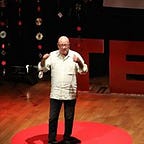UN-MASKING CULTURE
Bob Deutsch
Yesterday, I was speaking to a teacher. Since the Coronavirus struck, all the way up until the beginning of this past week, she wasn’t teaching. Now she is teaching again, but her classes are out-of-doors and class sizes have shrunk from their usual numbers, as, she guess, some parents are keeping their kids at home, afraid of contagion.
This teacher told me that during these last couple of months she has been very careful. She mostly stayed at home except for short trips to get necessities from the market, at which time she always wore a mask, goggles, gloves and brought with her some hand sanitizer.
She washes her hands repeatedly, whether at home or after she steps out.
One thing she said with a quizzical face was that a few days ago she noticed much of what distinguishes the identity of her hands — at least to herself — has been washed away from so much washing. She said, “Seemingly the crevices and digit joint-lines seem different compared to before the threat of Covid-19 made her a near-obsessive hand washer.”
Okay, that’s her, one person. But there are many Americans like her — smart and responsible, not wanting to catch or spread Covid-19. In contrast, listening to and watching the news over the last couple of weeks, I realized other Americans are not so wise.
A Lack of Self-Reflection Begets Selfishness
The Coronavirus pandemic has revealed something about American culture and a good portion of Americans, as a population: Americans can be a selfish lot.
What has become evident is that a sizable group of Americans — a country partly founded on a respect for the common good — doesn’t give a damn about anyone but themselves. They refuse to wear a mask and I bet you their hands look the same to them compared to pre-pandemic time. They carry placards, for example, saying things such as “Freedom, Not Tyranny.” These same people cite the U.S. Constitution as guaranteeing them the right not to wear a mask. They belittle science, but blindly follow Donald Trump, their lay epidemiologist.
I wondered, how has America come to this? It makes no sense. But historically, politically and culturally, perhaps there might be at least a partial explanation.
First, in America belonging is not a must. In America — in the land of the free — you can go it alone. And there is a freedom to that, but it comes with a heavy price. The cost is each American, unlike other cultures, does not have the assurance of a place in a social matrix to rest their head on. In the face of being cut loose from the ties that bind, life is hard in America, despite being a nation that has so much.
In response to this kind of “hard,” many Americans hunker-down, exerting their difference from others, thinking of life as a fixed pie — when someone else is up, you are down, and vice versa. That kind of defualt defensiveness messes with one’s cognition. Everything gets painted into extremes, with no subtlety or complexity, not realizing that with this attitude you are painting yourself into a corner. But no matter. The time-horizon for such individuals is so short they easily lose sight of context and live in a kind of staccato-now, in which every moment is independent of every other moment.
Another factor related to the tendency of Americans to be selfish is their general inability or dislike for self-reflection — a capacity for considering things bigger than “I want.” For this, perhaps the Industrial Revolution is partly to blame. When any entity, by dint of circumstance or temperament, skips over its adolescence and instead goes from its infancy into adulthood, there is trouble. Adolescence is a period of development wherein a person tests out and integrates various aspects of self-identity. During this interval people get to know themselves better and knowing something about who they are serves both to ground them and open them up. When this period is short-circuited or foreshortened, a graceful sensuality — and with it a capacity for empathy — is asunder.
Lastly, what comes to mind when trying to account for the American tendency towards selfishness — not having a concept of “WE” — is America has not yet actually developed a culture. In its place, America has the law and a way of behaving. That way is performance. Performance to a lay person means exaggerate yourself, puffing yourself up like a Thanksgiving Day parade balloon.
Great actors, particularly film actors, know they must scale back their gestures so as not to not overact. But us civilians are naive and unpracticed in the ways to gain attention such that people follow you because you make them feel good about themselves and their expanded sense of options.
Perhaps Proctor & Gamble, which started as a soap company, should, as a public service, begin a campaign that helps all of us turn our thinking about life as a soap opera — a dog-eat-dog reality show spectacle — into a nation that comes clean to the realities of life and of nature. Surprisingly, a model for this is life in primitive cultures (two of which I lived in some years ago as a young cultural anthropologist). Tribal life, like our modern American life, is not easy, but such tribes are better adapted than we are to their environment and to life as a “WE.” And isn’t that what Rep. John Lewis wrote about in his last communication — the need to redeem the soul of our body politic, and in so doing, expand the American story. For that we have to first un-mask who we are and reflect on how we got to be that.
